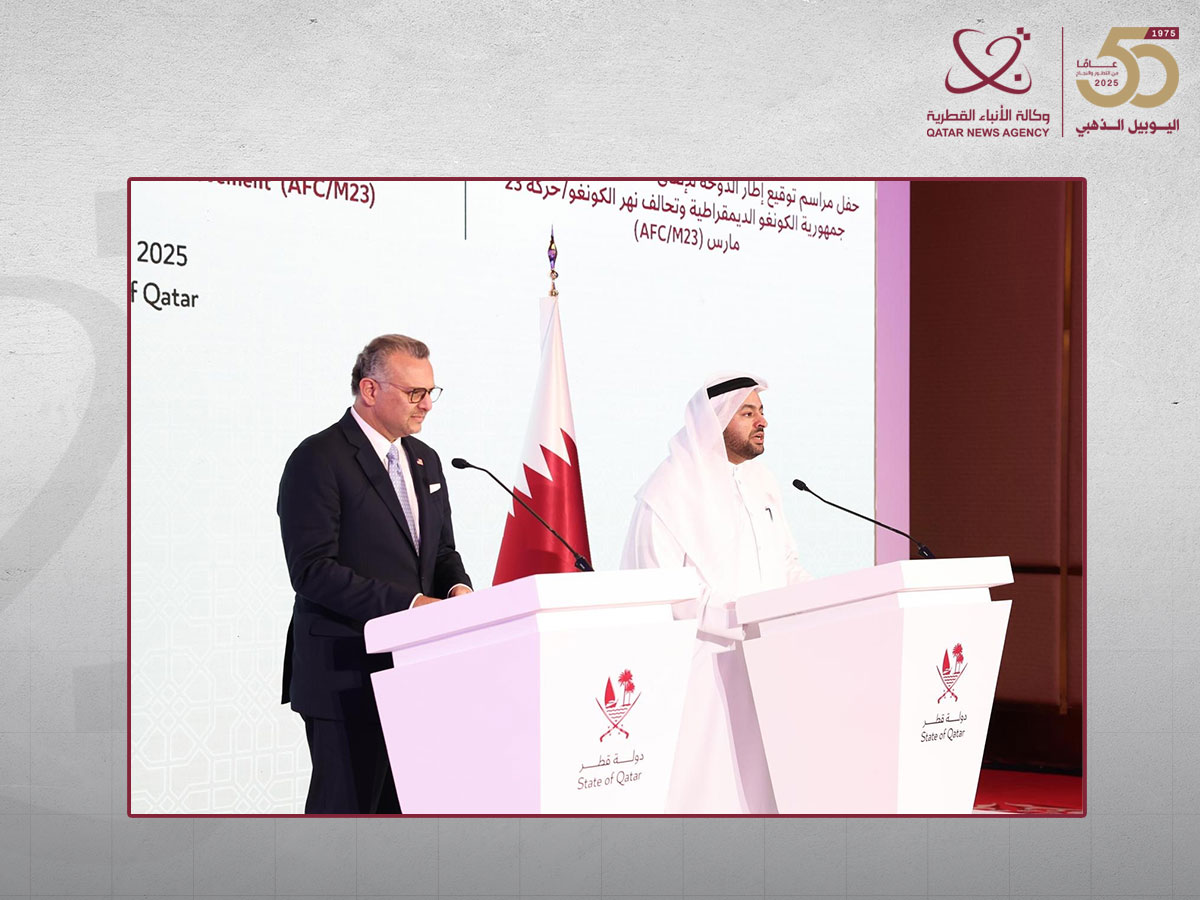Minister of State at Ministry of Foreign Affairs: Qatar Committed to Continuing Efforts for Comprehensive Peace for DRC People

Doha, November 15 (QNA) - HE Minister of State at the Ministry of Foreign Affairs Dr. Mohammed bin Abdulaziz bin Saleh Al Khulaifi affirmed that the signing of the Doha Framework Agreement for Peace between the Government of the Democratic Republic of the Congo (DRC) and the Congo River Alliance (March 23 Movement), which took place Saturday, represents an important step toward consolidating peace and stability in eastern Democratic Republic of the Congo.
His Excellency emphasized the State of Qatar's commitment to continuing support for this process until comprehensive peace is achieved for the Congolese people.
In a press conference on the signing of the agreement, His Excellency expressed Qatar's appreciation to both parties for demonstrating genuine political will and responsible commitment, which contributed to the achievement of this agreement.
He also valued their trust in Qatar's role in facilitating and advancing the peace process.
His Excellency praised the strong support provided by HE President of the Democratic Republic of the Congo Felix Tshisekedi, and his commitment to a peaceful resolution of the conflict.
He also commended the efforts of the government's negotiating delegation, the cooperation of the AFC/M23 Movement, and the contributions of partners, particularly the African Union, the Republic of Togo, the United States of America, the United Kingdom, the Republic of Rwanda, and the French Republic.
He noted that Qatar's efforts in this regard began when HH the Amir Sheikh Tamim bin Hamad Al-Thani hosted both HE President Tshisekedi and HE President Paul Kagame of the Republic of Rwanda in Doha, and when HE President Tshisekedi chose to open the door for dialogue with the AFC/M23 Movement.
Since March 2025, Doha hosted rounds of direct negotiations between the two parties, conducted in a spirit of positivity and high responsibility, leading to the agreement.
His Excellency stated that this progress was built on the momentum generated by the Declaration of Principles signed in Doha on July 19, 2025, which laid the foundation for a critical phase of confidence-building measures and opened the path for dialogue between the parties.
Over the past months, the parties achieved notable progress on key issues, including the signing of the ceasefire monitoring and verification mechanism on October 14, 2025, and the detainee release mechanism on September 14, 2025.
He noted that the declaration marked a pivotal step that paved the way for the framework and reinforced the shared commitment to peaceful solutions through dialogue and understanding, reflecting the genuine will of both parties to end the conflict and achieve lasting peace in eastern Democratic Republic of the Congo.
His Excellency emphasized that the signing of this framework does not represent the end of the road, but rather the beginning of a comprehensive peace process and rounds of negotiations to be held in the near future to discuss several core issues.
He stressed that peaceful solutions and political dialogue are the optimal path to ending conflicts and fulfilling the aspirations of the region's peoples.
He reaffirmed Qatar's steadfast commitment to preventive diplomacy and constructive dialogue as a strategic choice for conflict resolution, emphasizing that Qatar's mediation experience is based on direct communication between parties and the creation of common ground that contributes to building trust and enhancing peace opportunities.
His Excellency considered the signing of the Doha Framework Agreement for Peace today a historic opportunity that entails the responsibility of implementation by both parties.
He pointed out that Qatar's role in this process is not aimed at resolving all disputes at once, but rather at establishing a framework containing a number of core protocols to be negotiated, which will form part of the comprehensive peace agreement.
These protocols include: restoring state authority, reforms, arrangements for inclusive national governance, issues of identity and citizenship, return and resettlement of internally displaced persons and refugees, as well as economic recovery and enhancement of social services.
He explained that the comprehensive peace agreement will consist of the framework agreement and eight protocols, two of which have already been signed, while six protocols will be negotiated between the parties within two weeks from the date of signing the framework agreement.
The parties will also agree that the government will establish an independent commission to promote truth, reconciliation, and accountability for crimes, and to provide recommendations on appropriate reparations within a transitional justice process.
The organization and operation of this commission will be consistent with the constitution and international law. (QNA)





